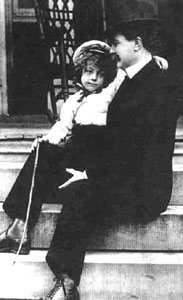
Edward Ward Carmack
Edward Ward Carmack, a powerful figure in turn-of-the-century Tennessee politics and a leader in the state’s temperance movement, was born in Sumner County. His father, a Christian Church minister, died during Carmack’s infancy, leaving the child to be raised amid hardship and poverty. Carmack overcame these obstacles and went on to attend Cumberland University, where he studied law. He then settled in Columbia, where he maintained a legal practice until he won a seat in the Tennessee General Assembly in 1884.
Carmack served one term in the legislature before returning to Columbia to pursue a career in journalism. He edited the Columbia Herald briefly, then moved to Nashville and established that city’s Democrat. In 1888 the Democrat was acquired by the Nashville American, and Carmack was named editor-in-chief of the newly expanded publication. Carmack quickly garnered a reputation as a combative journalist and a champion of popular causes. While at the American, he also developed a close relationship with the paper’s owner, Duncan Brown Cooper.
In 1892 Carmack left the American to become editor of the Memphis Commercial. He remained there until 1896, when he resigned to run for the U.S. House of Representatives in a bitter and close contest that unseated the incumbent, Josiah Patterson. He served two terms in the House and, in 1901, was elected to the U.S. Senate. During his tenure in Washington, Carmack earned a reputation as a reformer, opposing the interests of railroads and other monopolies. He was also an ardent foe of American imperialism, fighting both the annexation of Hawaii and the expansionist policies of President Theodore Roosevelt.
Throughout his early political career Carmack had been a moderate on the issue of prohibition and consistently favored the regulation, rather than the abolition, of alcohol. In the early twentieth century, however, he became a strong proponent of temperance. In his 1905 senatorial campaign, Carmack portrayed himself as an enemy of liquor interests, a position which may have cost him the race. A short time later, he publicly proclaimed his support for statewide prohibition.
Carmack’s announcement instantly made him a favorite among Tennessee’s temperance backers. Buoyed by this groundswell of support, Carmack declared his candidacy in the 1908 gubernatorial election. His opponent in the Democratic primary was Malcolm R. Patterson, the incumbent governor and the son of his old foe, Josiah Patterson. The prohibition issue bitterly divided Tennessee’s Democratic Party. Carmack attacked Patterson as a tool of the liquor interests. Patterson portrayed Carmack as an opportunist who converted to prohibition out of political expediency. The governor’s position earned him the support of Tennessee’s wet forces, including a majority of the state’s urban residents. It also won him the endorsement of Cooper, who had earlier broken with Carmack.
With strong urban support, Patterson narrowly won the Democratic primary and easily prevailed against his Republican challenger in the subsequent general election. Carmack, indignant over his loss, returned to journalism and became editor of the Nashville Tennessean, a prohibitionist daily. There he unleashed a barrage of attacks against Patterson while he belittled Cooper.
Outraged by such comments, Cooper sent a stern warning to Carmack to halt his attacks. Carmack, however, ignored these threats and continued to malign his former friend. The situation came to a head on November 9, 1908, when Cooper and his son Robin encountered Carmack on a downtown Nashville street. Fearing an ambush, Carmack fired on the pair, wounding the younger Cooper. Robin Cooper returned fire, killing Carmack instantly.
Carmack’s violent death created an uproar across Tennessee. Prohibitionists deemed the shooting an assassination and transformed Carmack into a slain martyr. Public opinion, incited by temperance propaganda, shifted in favor of prohibition. As a result, the Tennessee state legislature voted overwhelmingly to ban the sale, manufacture, and consumption of intoxicants in January 1909. At the same time, representatives also authorized the erection of a statue of Carmack by sculptor Nancy McCormack on the capitol grounds as a tribute to the fallen hero. Today, though prohibition is a distant memory, that statue still stands, a lasting tribute to a controversial and significant figure in Tennessee history.
Suggested Reading
Paul E. Isaac, Prohibition and Politics: Turbulent Decades in Tennessee, 1885-1920 (1965); William J. Majors, Editorial Wild Oats: Edward Ward Carmack and Tennessee Politics (1984); James Summerville, The Carmack-Cooper Shooting (1994)



